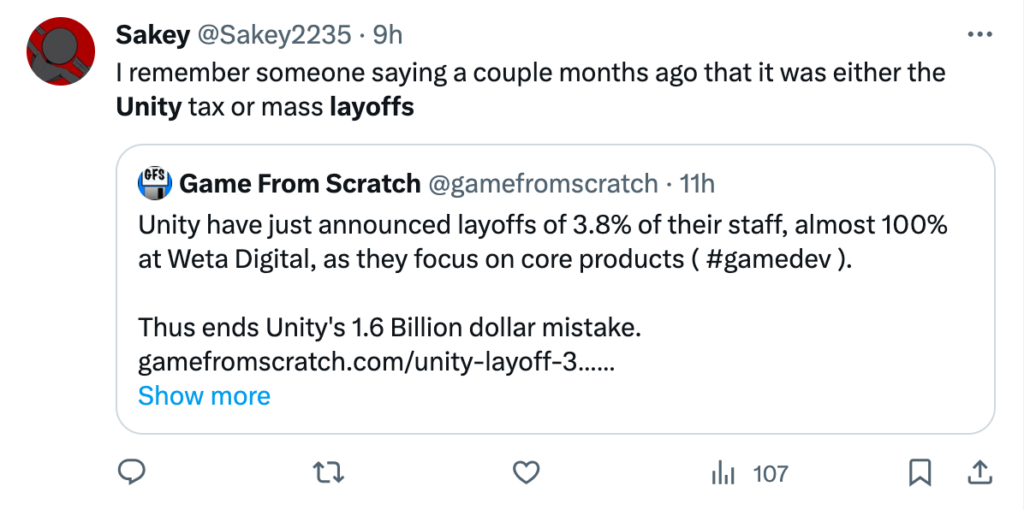Unity lets more staff go with new layoffs

• New tech layoffs hit Unity.
• These particular tech layoffs though come as no surprise.
• They come with the added sting of the end of agreement with Weta FX.
There have been two consistent headlines throughout the course of 2023 – the rise and rise of generative AI and the rise and rise of unemployed people in round after round of tech layoffs. Step right up for more of the same, Unity Software – the company has just announced it will cut 3.8% of its global workforce. That might sound like small fry, but works out as 265 jobs lost, 265 families cast into economic uncertainty – and it’s by no means all. The newest announcement will bring Unity’s tech layoffs for the year to 1,100.
The company is also planning to end an agreement with a digital video effects company founded by Lord of the Rings director, Peter Jackson. The move is part of a “reset,” the company said on Tuesday. Unity makes a software toolkit that’s used by many videogame developers including the maker of Pokemon Go, and the reset will bring the focus back to that.
The videogame software provider might have been on your bingo card of 2023 tech layoffs, as it has been through a tumultuous period. In its Q3 earnings it said it would “likely” be announcing layoffs.

Many feel like we were pre-warned about these layoffs.
Unity-watchers might remember that a few months ago, Unity tried a new strategy: to charge fees on video game developers after certain revenue and install thresholds were met. That should have indicated the dire straits the company was in. Regardless, huge pushback from gaming developers meant key parts of the plan were rolled back.
Plus, the company’s share price was slammed, losing 19% of its value after the pricing policy announcement.
When October rolled around, Unity CEO John Riccitiello retired and former IBM president Jim Whitehurst took over as interim CEO and president. Sequoia Capital partner Roelof Botha took over as board chairman.
Unity CEO John Riccitiello was EA CEO when FIFA 09 launched with loot boxes. Last year he said devs making games without monetization in mind are “fucking idiots.” In an EA stockholder meeting he entertained the idea of charging $1 to reload an ammo clip in Battlefield. https://t.co/lZlO37giVf
— Tom Warren (@tomwarren) September 13, 2023
The agreement Unity had struck with Peter Jackson’s visual effects company Weta FX was made in 2021 after Unity bought the Weta FX technology and engineering division.
The 265 jobs lost are those related to that agreement, Unity said. It’s not just tech layoffs, either: the company will shut down 14 locations – including Berlin and Singapore – pending employee consultation.
It will significantly reduce its office footprint for the remaining offices in places like San Francisco, Bellevue, and Washington. It’s dropping a former mandate that employees must work from the office three days a week and will reduce “full in-office services” to three days a week in most locations.
It is, quite literally, battening down the hatches.
Reuters reported the company as saying “while no further additions have been finalized, it’s clear that we will reduce the number of things we are doing overall.”
Some have pointed out that this is “another quarterly round of layoffs,” gesturing to eight or nine instances of job cuts at the company over the last two years.
Tech layoffs only hurt the little guy
After the fees debacle in September, Riccitiello’s hasty retirement looked to be a direct response to customer backlash. He’s not an especially popular guy, although does get some credit for Unity’s growth during his nine years at the top.
Still, despite arguably running Unity into the ground, Riccitiello’s net worth sits at about $155 million. Heading a company that’s never made a profit, that’s a pretty impressive feat.

John Riccitiello. Bloomberg via Getty Images.
It’s hard not to compare this with the outlook for many of those laid off. Particularly so given that the acquisition of Weta FX happened under Riccitiello’s leadership – at the eyewatering price of $1.6 billion.
This latest round of tech layoffs hasn’t come as a huge surprise but is nonetheless indicative of a worrying trend. While hardware companies have had to strip back after the pandemic buying boom, it seems that the investments made by software providers have failed to provide.










